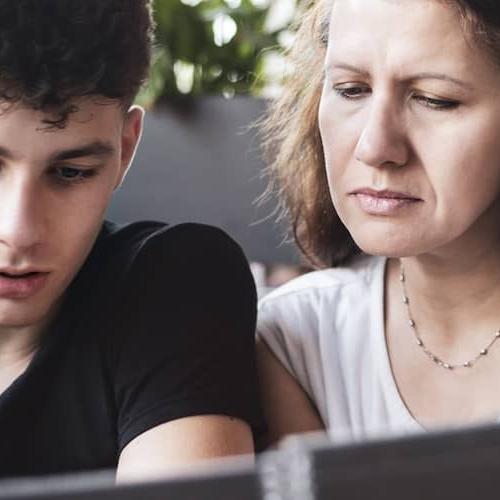Bankruptcy loans: How to get a loan after bankruptcy
Author:
Kate Friedman
Sep 13, 2025
•6-minute read
If you’ve filed for bankruptcy, you’re not alone. In 2024, bankruptcy filings increased by more than 16% from the previous year, according to the Administrative Office of U.S. Courts, with nearly 300,000 Chapter 7 filings that year. You may expect it will be difficult to get a loan with a bankruptcy on your record. You’re not wrong, but it’s also still possible to get a loan after bankruptcy.
Can you get a post-bankruptcy loan?
Yes, you can get a personal loan after bankruptcy. However, lenders will see you as a high-risk borrower and be more reluctant to approve you. If they do approve you, you can expect to pay a higher interest rate.
Common challenges to getting a post-bankruptcy loan include:
- You might pay a higher interest rate, as interest is based on your credit score. Because bankruptcy can stay on your credit report for up to 10 years, you can expect to pay higher interest rates for credit for some time.
- You might be charged higher origination fees. These fees guarantee a return on their investment if you default on your loan.
- Your lender might ask for collateral. In this case, you’ll have what’s called a secured loan.
How types of bankruptcy affect personal loan eligibility
There are two types of personal bankruptcy: Chapter 7 and Chapter 13.
Chapter 7 bankruptcy
Chapter 7 bankruptcy is the most severe option for people with significant debt. It has strict requirements because it allows you to discharge your debts, except for student loans, child support, and tax debts. To qualify, you must pass a means test and meet specific income requirements.
All financial information, as well as the value of all possessions, must be given to a trustee who oversees the process. You can keep possessions equal to or less than the allowed financial exemption, as well as anything necessary for everyday living. Everything else is sold, with the proceeds paid to your debtors.
Under Chapter 7, debts usually are discharged about 6 months after you file. You can then start over with a relatively debt-free slate.
Chapter 7 bankruptcies remain on your credit report for up to 10 years, though the impact on your credit score will gradually reduce over time.
Chapter 13 bankruptcy
Chapter 13 bankruptcy allows individuals to reorganize their finances. Instead of discharging your debts, Chapter 13 lets you come up with a plan to repay your debts over 3 – 5 years. Because you’re eventually going to pay your debts, you usually can keep your possessions. This option is generally for people who have a steady income or other financial means to handle the situation.
Chapter 13 bankruptcies stay on your credit report for 7 years.
Impact on credit score
While both types of bankruptcy significantly reduce your credit score, your credit can improve with time. Monitoring your credit post-bankruptcy will help you get back on track.
Lower credit scores often lead to higher interest rates on loans, as they suggest you are a high-risk borrower. However, if your score recovers to 650 or above, you’re in better standing for loans.
Keep in mind that even if your credit score recovers, the fact that you filed for bankruptcy will remain on your credit report for 7 or 10 years.
How to get a personal loan after bankruptcy
The process for getting a personal loan post-bankruptcy is not that different from getting a loan without one.
- Decide how much you need to borrow. You might need a few thousand dollars to make ends meet while you get back on your feet, or you might need tens of thousands of dollars if you anticipate ongoing financial strain. Most lenders will offer anywhere from $1,000 to $50,000 for a personal loan.
- Review your credit report and finances. Go through your report carefully and make sure there are no errors. Reviewing your report and assessing your current debt and finances will help you better understand your financial situation.
- Research different lenders. Make sure you understand lender requirements before spending time applying for a loan. A loan application requires a hard credit inquiry, and you don’t want to hurt your score even more if you’re likely to be rejected.
- Get prequalified with different lenders. This will allow you to compare interest rates, terms, additional fees, and the monthly payment. Prequalifications don’t require hard credit pulls, so they won’t hurt your credit.
- Apply for the loan. Fill out the application with your preferred lender. Prepare for a temporary drop in your credit score during the application process.
- Wait for loan approval. Personal loans are usually quick to pay out, with the borrower receiving funds a few business days after approval.
Unsecured personal loan alternatives after bankruptcy
A traditional personal loan or other form of unsecured debt is not your only option after bankruptcy. Here are a few alternatives.
Secured personal loans
It may be easier after a bankruptcy to apply for a secured loan, which means you need to provide collateral. This is something valuable, such as a house or a car, that you offer the lender to guarantee that you will pay back your loan.
Lenders might prefer secured loans if a borrower has a low credit score or a history of bankruptcy. If the borrower defaults, the lender keeps the collateral and can sell it to recoup its losses.
While these might be easier to get, it’s important to realize that you could lose your collateral if you fail to pay back the loan.
Rocket Loans℠ doesn’t offer secured personal loans at this time.
Home equity loans or HELOCs
A home equity loan or home equity line of credit may be an option if you own a home.
The main difference is that a home equity loan is for a lump sum, while a HELOC is a revolving line of credit with a withdrawal period and a repayment period. A HELOC is more flexible and may be a better fit if you don’t know how much you need to borrow.
Both loans are second mortgages. You’ll make payments in addition to your primary mortgage, and your home will serve as collateral. Because these are secured loans, qualifications might be lower than those required for a primary mortgage.
One thing to consider is that you risk losing your home if you fall behind on these payments.
Rocket Mortgage® doesn’t offer HELOCs at this time.
Secured credit cards
A secured credit card requires cash as collateral. For example, if you have $1,000 you can allocate for the card, then your credit limit will be $1,000. Unfortunately, secured credit cards require you to have cash on hand, which not everyone who recently went through bankruptcy has. On the other hand, even a secured credit card with a low limit can help you rebuild your credit score with on-time payments.
Co-signed loans
If you’re facing severe hardship or are uncomfortable with secured debt, you can ask a family member or a friend with better credit to co-sign a loan. Co-signers agree to repay the loan if the primary borrower defaults. A missed payment affects the credit score of both borrowers. Because of the risks involved, you’ll want someone you really trust as a co-signer.
Loans to avoid after bankruptcy
Sometimes, when you need help, you might find ways to get some quick cash that seem too good to be true. Be careful of predatory lending practices, which take advantage of those facing financial hardship who might feel like they have no other options. The Federal Trade Commission warns against the following risky loans:
- Payday loans: Payday loans are quick cash funding options without credit checks that require repayment at your next paycheck. They have very high annual percentage rates. An APR of 400% is not unheard of. There are also lending and rollover fees, often leaving you in even greater debt than before.
- Title loans: Title loans are similar to payday loans in that nearly anybody can get one, but they require collateral. This is usually your car, which you risk losing if you can’t pay it back right away.
These loans might offer fast cash with few qualifications. They might even provide rollover options if you can’t pay back right away, but if something seems too good to be true, it probably is.
FAQ
Here are answers to common questions about getting a loan after bankruptcy.
How long do I have to wait to get a personal loan after bankruptcy?
How long you must wait to be approved for a new loan depends on what kind of bankruptcy you have and how long until your outstanding debt is discharged. A Chapter 7 bankruptcy can take up to six months, while a Chapter 13 payment plan can be as long as 5 years. Meanwhile, the bankruptcy will stay on your credit report for 7 to 10 years.
Are there banks that work with bankruptcies for personal loans?
All banks, credit unions, and private lenders have their own standards for approving personal loans. Some might have more relaxed credit score requirements than others. You can ask around to find one that works with borrowers who have recently filed for bankruptcy.
What credit can you get after bankruptcy?
Your credit options might be limited after bankruptcy, but you can still get secured and unsecured personal loans, secured credit cards, home equity loans, or HELOCs under the right circumstances.
The bottom line: You can get approved for a loan post-bankruptcy
Filing for bankruptcy will hurt your credit score and remain on your credit report for some time. It will be more difficult to get an unsecured personal loan, but it won’t be impossible. You can choose a different kind of loan or wait until your credit score has sufficiently increased before applying. What works for you will depend on your situation.
To get an idea of what your interest rates and loan terms might look like on a personal loan, start the process today with Rocket Loans℠.

Kate Friedman
Kate is a contributing writer and publisher who has worked with Rocket since 2022. She also works as a middle-school interventionist and has taught personal finance and life skills to high-schoolers.
Related Resources

9-minute read
What is an unsecured loan and should you use one?
Unsecured loans don’t require collateral and are approved based on your creditworthiness as a borrower. Learn the pros and cons of getting an unsecured loan.
Read more

9-minute read
Getting a $30,000 loan: Everything you should know
See the possibilities for getting a $30,000 loan and learn about personal loan eligibility requirements, pros and cons, and alternative lending options.
Read more
7-minute read
Personal Loan Requirements: How To Apply For Financing
Personal loan requirements vary from one lender to another. Uncover six steps to applying for a personal loan and learn the basics of personal loan eligibility.
Read more